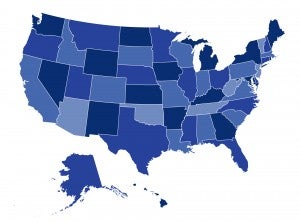Tag: state regulators
December Research Roundup: What We’re Reading

Happy New Year! The holiday season may be over, but health policy researchers continue to bestow gifts onto our field. In December, we read about disruptions in health insurance coverage, the uninsured population, and gaps in provider network oversight. This roundup will highlight key findings of these articles, as well as their significance for our work.
Broker Commissions for Mid-Year Enrollment in the Marketplaces: Options for State Marketplaces and Insurance Regulators to Prevent Discrimination

Several insurers have eliminated broker commissions for mid-year marketplace enrollment. In a new Expert Perspective for the State Health & Value Strategies project, CHIR’s Justin Giovannelli looks at the consequences of cutting broker commissions for special enrollment periods, including risk of coverage losses, market instability, and potential violations of federal nondiscrimination rules.
In the Age of COVID-19, Short-Term Plans Fall Short for Consumers

During February’s State of the Union address, President Trump touted his administration’s efforts to expand access to short-term health plans that do not comply with any of the ACA’s consumer protections. Short-term plans are often cheaper than ACA-compliant plans because they can deny coverage to people and exclude entire categories of services. In a recent post supported by The Commonwealth Fund, we reviewed 12 short-term plans to determine what coverage consumers would have if they needed treatment for COVID-19. We found that consumers in short-term plans are likely to have less financial protections than those enrolled in ACA plans.
Aliera Healthcare Prompts Increased State Activity on Health Care Sharing Ministries

Over the last few months, state officials have increasingly acted to warn consumers about the potential risks of enrolling in health care sharing ministries (HCSMs). These efforts have ranged from educating consumers on HCSMs to initiating legal action against fraudulent practices. While some consumers may find value in HCSMs, recent actions by Aliera Healthcare provide one example of how entities may use HCSMs’ unregulated status to skirt oversight and take advantage of consumers.
New Addition to Advocate Toolkit Highlights Options for Protecting Consumers Amidst Expansion of Short-Term Plans

In July, a federal district court judge upheld the Trump administration’s rule expanding availability of short-term, limited duration insurance, or short-term plans, which do not have to comply with the Affordable Care Act’s consumer protections. With the help of CHIR experts, Community Catalyst has published another resource for state advocates and policymakers, providing an overview of short-term plans, insight on unscrupulous sales practices that leave consumers at risk, and state regulatory options.
The Marketing of Short-Term Health Plans: Industry Practices Create Consumer Confusion

A 2018 federal rule changing the definition of short-term limited-duration insurance (STLDI) has created a new marketing opportunity for insurance companies and brokers. In a new study, CHIR experts assess short-term plan insurers’ marketing tactics in the wake of the new federal rules and how regulators have prepared for this new market.
Federal Flexibility Grants Highlight State Priorities for Market Stability

Last month, the Department of Health & Human Services awarded $8.6 million in grants to 30 states and the District of Columbia to provide additional support to implement certain ACA market reforms, including guaranteed issue, guaranteed renewal, and the Essential Health Benefits. CHIR’s Rachel Schwab took a look at how states plan to use the federal funding, and what tops the list of state market stabilization and consumer protection priorities.
Impact of Association Health Plans on Consumers and Markets Will Depend on State Approaches

In June, the U.S. Department of Labor issued a final regulation that implements President Trump’s executive order encouraging the expansion of association health plans for small businesses and self-employed individuals. Under these rules, professional or trade associations will be permitted to sell health plans that are exempt from many Affordable Care Act protections as early as September 1, 2018. To better understand how these new rules will affect states, CHIR experts interviewed six state regulators.
New Report Examines State Options for Oversight of Risk-Bearing Provider Organizations

Value-based payment models are promoted as a way to transform our health care system from one that rewards value rather than the volume of health care services delivered. These models require providers to accept the risk of financial losses should spending on patients in their care exceed targeted levels. A new brief from State Health and Value Strategies, authored by researchers at Bailit Health and CHIR, explores potential state approaches to oversight of provider organizations that accept financial risk.


